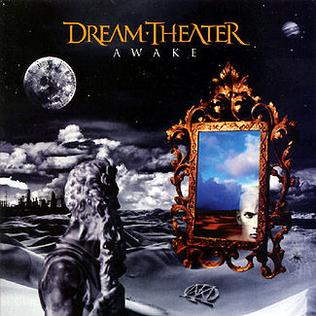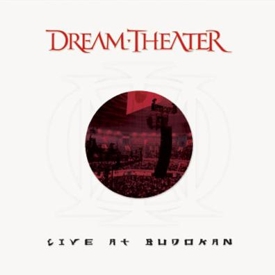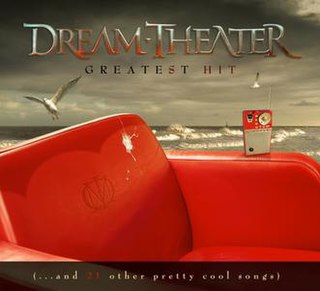
Dream Theater is an American progressive metal band formed in 1985 in Boston, Massachusetts. The band comprises John Petrucci (guitar), John Myung (bass), Mike Portnoy (drums), James LaBrie (vocals) and Jordan Rudess (keyboards).

Liquid Tension Experiment (LTE) is an American instrumental progressive metal supergroup founded by Mike Portnoy, in 1997. The band initially released two albums, between 1998 and 1999. An extension of their second regular album, with the absence of John Petrucci was released in 2007 under the name "Liquid Trio Experiment".

Jordan Rudess is an American keyboardist, composer, and software developer best known as a member of the progressive metal band Dream Theater and the supergroup Liquid Tension Experiment.

Metropolis Pt. 2: Scenes from a Memory is the fifth studio album and first concept album by American progressive metal band Dream Theater, released on October 26, 1999, through Elektra Records. It was recorded at BearTracks Studios in Suffern, New York, where the band had previously recorded their second studio album, Images and Words (1992), and the EP A Change of Seasons (1995).

Train of Thought is the seventh studio album by American progressive metal band Dream Theater, released on November 11, 2003 through Elektra Records.

John Peter Petrucci is an American guitarist, best known as a founding member of the progressive metal band Dream Theater. He produced or co-produced all of Dream Theater's albums from Metropolis Pt. 2: Scenes from a Memory (1999) to A View from the Top of the World (2021), and has been the sole producer of the band's albums released since A Dramatic Turn of Events (2011). Petrucci has also released two solo albums: Suspended Animation (2005) and Terminal Velocity (2020).

Awake is the third studio album by American progressive metal band Dream Theater, released on October 4, 1994, through East West Records. It is the final Dream Theater album to feature original keyboardist Kevin Moore, who announced his decision to leave the band during the mixing process of the album.

Six Degrees of Inner Turbulence is the sixth studio album by American progressive metal band Dream Theater, released as a double-disc album on January 29, 2002, through Elektra Records. It is the first full-length Dream Theater album to feature a title track. It is also their second longest studio album to date, after The Astonishing (2016).

Once in a LIVEtime is the second live album by American progressive metal band Dream Theater, released in 1998. It is their second live release. It was produced and recorded by Kevin Shirley during the European leg of the Touring into Infinity world tour, at the Bataclan theater in Paris.

Live at Budokan is the fourth live album by American progressive metal band Dream Theater on October 5, 2004, available on either 3 CDs, 2 DVDs, or 1 Blu-ray Disc. It was recorded at the Nippon Budokan Hall on April 26, 2004 in Tokyo, Japan.

Octavarium is the eighth studio album by American progressive metal band Dream Theater. Released on June 7, 2005, it was the band's final release with Atlantic Records. Recorded between September 2004 and February 2005, it was the last album recorded at The Hit Factory in New York City. With it, the band decided to create "a classic Dream Theater album", drawing upon their various stylistic influences while trying to make the music less complex. The album takes its creative concept from the musical octave.

"Another Day" is a song by American progressive metal band Dream Theater, released in their 1992 album Images and Words. It was released as the album's second and final single in 1993.

Score is the fifth live album by American progressive metal band Dream Theater. It was recorded on April 1, 2006 at Radio City Music Hall in New York City. The concert was the last of their 20th Anniversary Tour, labeled "A Very Special Evening with Dream Theater". The entire second half of the concert features a complete symphonic orchestra, dubbed "The Octavarium Orchestra", conducted by Jamshied Sharifi.
"Six Degrees of Inner Turbulence" is the sixth song and title track on the album of the same name, written and performed by American progressive metal band Dream Theater. Though the song is essentially broken up into eight movements on separate tracks, it lasts 42 minutes in full and takes up the entire second CD of the album. The song was conceived when keyboardist Jordan Rudess wrote what would become the "Overture" section, and the band took various melodies and ideas contained within it and expanded them into segments of the complete piece. The song explores the stories of six individuals suffering from various mental illnesses. Particularly represented are bipolar disorder, post-traumatic stress disorder, schizophrenia, post-partum depression, autism, and dissociative identity disorder.

Systematic Chaos is the ninth studio album by American progressive metal band Dream Theater. Released on June 4, 2007 in the United Kingdom and June 5, 2007 in the United States, Systematic Chaos was the band's first release through Roadrunner Records, which was sold to their previous label Atlantic Records, through which the band had released their previous studio album Octavarium (2005). The album was recorded from September 2006 to February 2007 at Avatar Studios in New York City, after the band's first break from summer touring in ten years. The lyrics of the album were written by John Petrucci, James LaBrie, and Mike Portnoy about fictional, political, and personal topics, respectively.

Greatest Hit is a compilation album by American progressive metal band Dream Theater released in Australia on March 29, 2008, and by Rhino Records in the United States on April 1. The title alludes to their only top 10 radio hit, "Pull Me Under". It features three songs from their breakthrough album Images and Words remixed by Kevin Shirley: "Pull Me Under", "Take the Time", and "Another Day". It also features the song "To Live Forever", an Awake-era re-recording of the song from the Images and Words sessions, which was previously unreleased on a full-length album. Several single edits of popular Dream Theater songs are also featured on this compilation.
The Twelve-step Suite is a set of five songs by American progressive metal band Dream Theater. One song was featured on each Dream Theater studio album from Six Degrees of Inner Turbulence to Black Clouds & Silver Linings.
"A Mind Beside Itself" is a three-part song cycle by American progressive metal band Dream Theater, comprising the songs "Erotomania", "Voices" and "The Silent Man". It was first released on Dream Theater's 1994 album Awake.

Wither is a single by American progressive metal band Dream Theater, released on September 15, 2009. The single contains the album version of the song "Wither", an alternative version of "Wither" with vocals and piano only, a demo of "Wither" with John Petrucci on vocals, and a demo of "The Best of Times" with Mike Portnoy on vocals. It is the band's last official release with Portnoy, who left the band in September 2010 until his return in October 2023. This is the only studio release without the Majesty symbol in its front cover.

A Dramatic Turn of Events is the eleventh studio album by American progressive metal band Dream Theater, released worldwide in September 2011 through Roadrunner Records. It is the band's first recording to feature drummer Mike Mangini, following the departure of founding member Mike Portnoy in September 2010. The album was written, recorded, mixed, and mastered between January and June 2011 at Cove City Sound Studios in Long Island, New York. It was produced by guitarist John Petrucci and mixed by Andy Wallace. Two singles, "On the Backs of Angels" and "Build Me Up, Break Me Down", were released in promotion of the album.
















